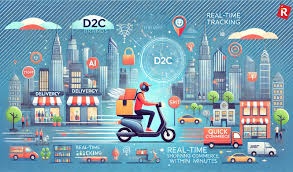Mumbai/Kolkata: With the rise of instant delivery platforms such as Zepto, Blinkit, and Swiggy Instamart, fast-moving consumer goods (FMCG) companies are revamping their supply chains to cater to evolving consumer preferences. Industry leaders like Hindustan Unilever, Marico, Adani Wilmar, and Parle are setting up dedicated sales and distribution verticals for quick commerce (Q-comm), aiming to differentiate this segment from their traditional e-commerce and offline retail channels.

The Rise of Q-Comm in FMCG
The Q-comm sector, which promises deliveries within 10-20 minutes, has witnessed exponential growth over the past two years. Industry estimates suggest that Q-comm now contributes 10-12% of total FMCG sales, with leading brands seeing even higher penetration.
“The fundamental shift in consumer behavior necessitates a new supply chain approach. Unlike conventional retail, where stock replenishment happens weekly, Q-comm requires restocking 1-2 times per week due to high turnover,” said Sagar Malviya, a retail market analyst.
Challenges and Adaptation Strategies
Managing Q-comm logistics is complex due to its demand for micro-fulfillment centers, last-mile delivery efficiency, and rapid stock movement. Companies are optimizing their product assortments, ensuring that high-demand items like dairy, personal care, and packaged foods are always available.
“Unlike traditional e-commerce, where consumers plan purchases, Q-comm thrives on impulse buying and convenience. Brands must align their supply chain to support this model,” said an executive at a leading FMCG firm.
As competition intensifies, companies are leveraging data analytics and AI-driven inventory management to streamline operations. Experts predict that Q-comm will continue reshaping the retail landscape, forcing FMCG giants to innovate faster than ever before.
